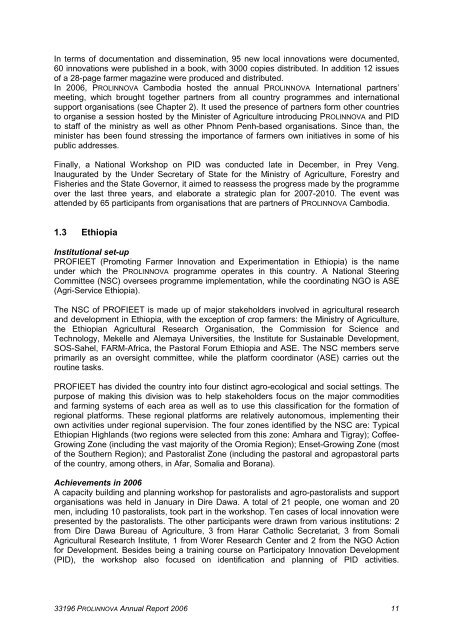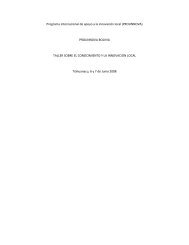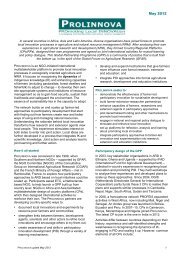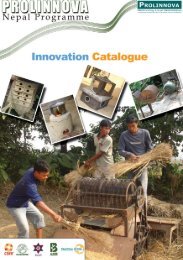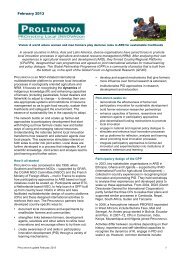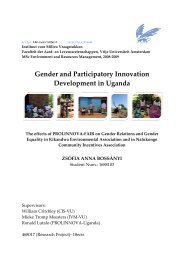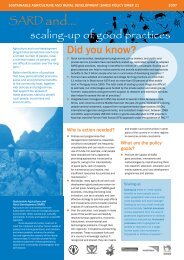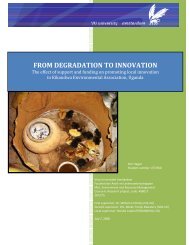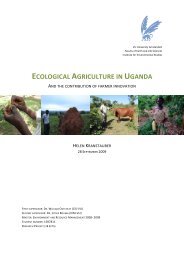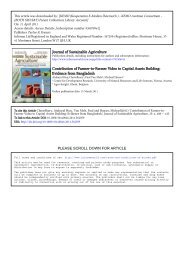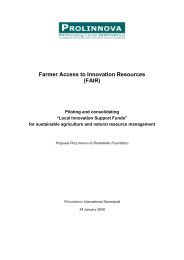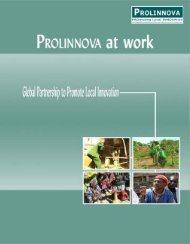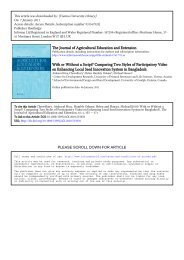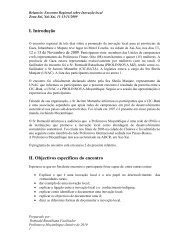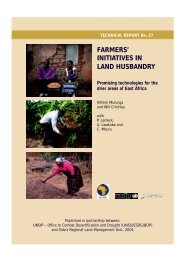2006 ANNUAL REPORT & PROGRAMME REPORT ... - Prolinnova
2006 ANNUAL REPORT & PROGRAMME REPORT ... - Prolinnova
2006 ANNUAL REPORT & PROGRAMME REPORT ... - Prolinnova
Create successful ePaper yourself
Turn your PDF publications into a flip-book with our unique Google optimized e-Paper software.
In terms of documentation and dissemination, 95 new local innovations were documented,<br />
60 innovations were published in a book, with 3000 copies distributed. In addition 12 issues<br />
of a 28-page farmer magazine were produced and distributed.<br />
In <strong>2006</strong>, PROLINNOVA Cambodia hosted the annual PROLINNOVA International partners’<br />
meeting, which brought together partners from all country programmes and international<br />
support organisations (see Chapter 2). It used the presence of partners form other countries<br />
to organise a session hosted by the Minister of Agriculture introducing PROLINNOVA and PID<br />
to staff of the ministry as well as other Phnom Penh-based organisations. Since than, the<br />
minister has been found stressing the importance of farmers own initiatives in some of his<br />
public addresses.<br />
Finally, a National Workshop on PID was conducted late in December, in Prey Veng.<br />
Inaugurated by the Under Secretary of State for the Ministry of Agriculture, Forestry and<br />
Fisheries and the State Governor, it aimed to reassess the progress made by the programme<br />
over the last three years, and elaborate a strategic plan for 2007-2010. The event was<br />
attended by 65 participants from organisations that are partners of PROLINNOVA Cambodia.<br />
1.3 Ethiopia<br />
Institutional set-up<br />
PROFIEET (Promoting Farmer Innovation and Experimentation in Ethiopia) is the name<br />
under which the PROLINNOVA programme operates in this country. A National Steering<br />
Committee (NSC) oversees programme implementation, while the coordinating NGO is ASE<br />
(Agri-Service Ethiopia).<br />
The NSC of PROFIEET is made up of major stakeholders involved in agricultural research<br />
and development in Ethiopia, with the exception of crop farmers: the Ministry of Agriculture,<br />
the Ethiopian Agricultural Research Organisation, the Commission for Science and<br />
Technology, Mekelle and Alemaya Universities, the Institute for Sustainable Development,<br />
SOS-Sahel, FARM-Africa, the Pastoral Forum Ethiopia and ASE. The NSC members serve<br />
primarily as an oversight committee, while the platform coordinator (ASE) carries out the<br />
routine tasks.<br />
PROFIEET has divided the country into four distinct agro-ecological and social settings. The<br />
purpose of making this division was to help stakeholders focus on the major commodities<br />
and farming systems of each area as well as to use this classification for the formation of<br />
regional platforms. These regional platforms are relatively autonomous, implementing their<br />
own activities under regional supervision. The four zones identified by the NSC are: Typical<br />
Ethiopian Highlands (two regions were selected from this zone: Amhara and Tigray); Coffee-<br />
Growing Zone (including the vast majority of the Oromia Region); Enset-Growing Zone (most<br />
of the Southern Region); and Pastoralist Zone (including the pastoral and agropastoral parts<br />
of the country, among others, in Afar, Somalia and Borana).<br />
Achievements in <strong>2006</strong><br />
A capacity building and planning workshop for pastoralists and agro-pastoralists and support<br />
organisations was held in January in Dire Dawa. A total of 21 people, one woman and 20<br />
men, including 10 pastoralists, took part in the workshop. Ten cases of local innovation were<br />
presented by the pastoralists. The other participants were drawn from various institutions: 2<br />
from Dire Dawa Bureau of Agriculture, 3 from Harar Catholic Secretariat, 3 from Somali<br />
Agricultural Research Institute, 1 from Worer Research Center and 2 from the NGO Action<br />
for Development. Besides being a training course on Participatory Innovation Development<br />
(PID), the workshop also focused on identification and planning of PID activities.<br />
33196 PROLINNOVA Annual Report <strong>2006</strong> 11


